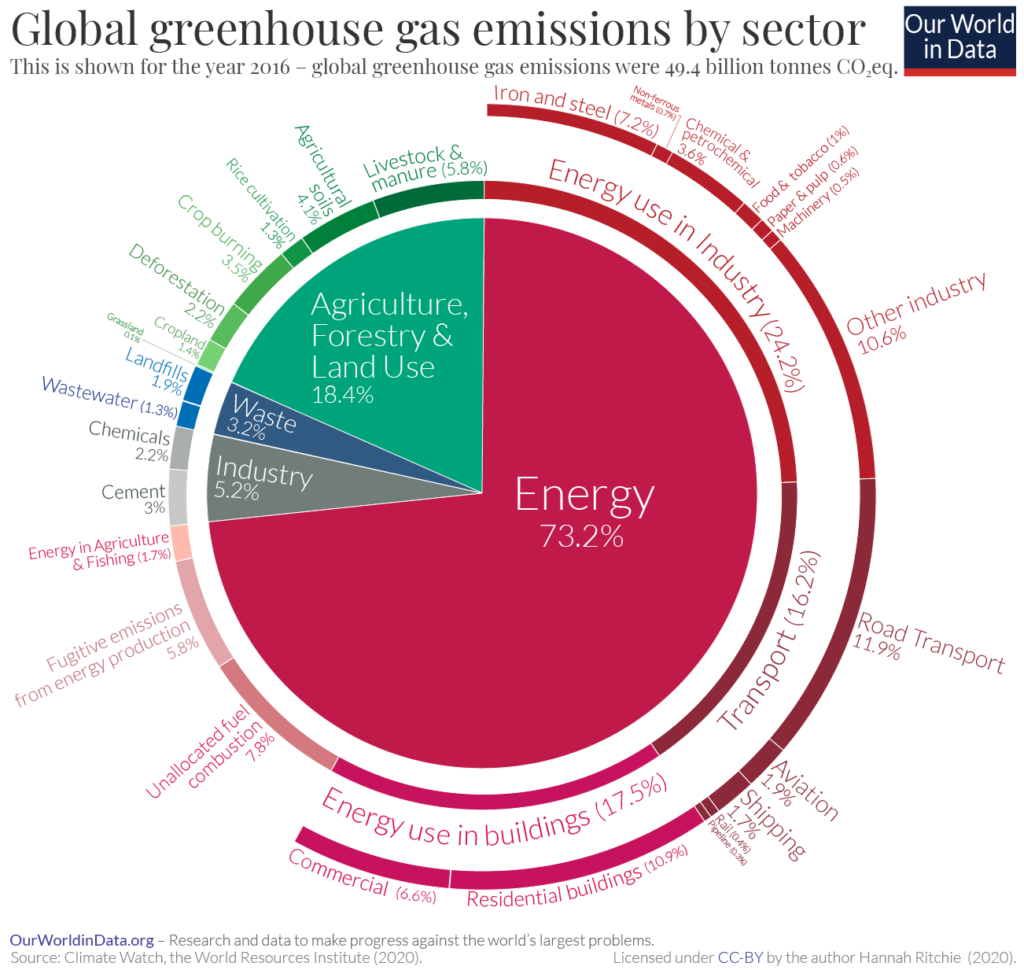As global citizens it is important for all of us to be aware of the impact that we have on the environment.
Just last year, there was around 50 billion tonnes of greenhouse gases emitted globally, of which transportation takes up 16.2% and shipping 1.7%, as pictured below.

Despite the large amount of greenhouse gases generated, most people feel disconnected from the actions they are taking and the impact that these actions have on the environment. This disconnect can make it difficult for people to make their first tangible steps towards reducing their carbon footprint. Therefore, it is up to organisations and businesses to take responsibility and action, to make tangible and sustainable actions to reduce their carbon footprint. Businesses would also be able to affect a larger change more quickly than individuals.
Ecological impact of importing bottled water in the F&B industry
(For businesses in the F&B industry, one factor that contributes to the carbon footprint of these companies would be through the import and export of ingredients. This includes an often-overlooked essential component of many F&B establishments – bottled water. Most specifically, imported bottled water.)
Importing bottled water has a significant impact on the environment. The process of that leads to bottled water as a final product – making the bottles used to store water, processing, bottling, testing and labelling of the water, chilling and ensuring the safety of the water and transporting the water, all produce significant carbon emissions.
For businesses to meaningfully affect a change, to reduce the carbon emission generated by the production of bottled water, this can be done through reducing the need for transportation of water through using alternatives.
Why Choose Premium Filtered Water?
#1 Reducing Carbon footprint: Cutting Transport and shipment will reduce from 43% the carbon footprint
As shown in the infographic below, a large percentage of the total emissions that come from bottled water comes from transport and shipment. Removing the need to import bottled water could help to drastically reduce the amount of greenhouse gases generated by the company, by about 43%.
Each glass bottle consumes 0.35 gram of CO2 to be created and 0.37 to be imported.

Given that each glass bottle of water produces 0.37g of carbon dioxide due to transportation, it is easy to see how in a country like Singapore, where imported water is a booming industry, this would add up to be a significant figure.
#2 A Sustainable Alternative Which Does Not Compromise On Quality
There are now alternatives to imported bottled water that companies can use, which do not compromise on water quality. One of the most accessible and carbon-efficient alternatives would include using premium filtered tap water. This is especially so in a country like Singapore, where the tap water is already potable.
#3 At A Fair Price
Aside from environmental benefits, there are also economic benefits to switching to alternatives like premium filtered tap water. Each bottle of imported water costs $8, whereas premium filtered can be produced at a much more reasonable price.
#4 It’s your choice, your chance to act by supporting sustainable commitment in the F&B
Merci Marcel’s commitment
Premium filtered water allows us to reduce the need to import water, and cut out all the greenhouse gases generated through the transportation process. For Merci Marcel in particular, the switch to using premium filtered water would help to reduce the company’s carbon emissions by 7 tons.
Today, we have then decided to say « non merci » to imported bottled water. Together, we support a cleaner planet, through reducing our carbon footprint and also supporting projects that support the environment. Half of the revenue generated from our premium bottled water will go directly to our tree-planting project in Sumatra with the Charity Green Steps Group.

We hope that you would be able to work together with us towards a greener future!
Sources
1 https://ourworldindata.org/ghg-emissions-by-sector
2 https://onlinelibrary.wiley.com/doi/abs/10.1111/j.1539-6924.2011.01695.x
3 https://iopscience.iop.org/article/10.1088/1748-9326/4/1/014009/meta
4 https://www.channelnewsasia.com/news/singapore/singapore-s-s-134m-bottled-water-addiction-7633342